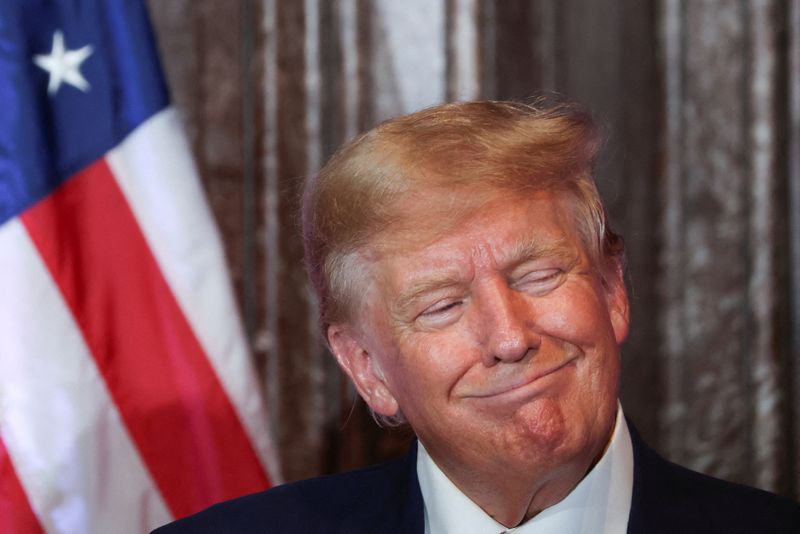Who is Kevin Hassett? Wolfe looks at the Trump ally tipped to become Fed Chair.
By Joseph Ax and Jason Lange
(Reuters) - Democratic U.S. voters express less support for President Joe Biden running for a second term 2024 than Republicans do for former President Donald Trump's latest White House bid, a Reuters/Ipsos poll shows, a potentially worrisome sign for Biden as he prepares to announce his re-election campaign.
Fifty-two percent of registered Democrats said Biden should not seek a second term, compared to 40% of Republicans who said Trump should not run again, according to the national poll, which gathered responses from 4,408 adults from Feb. 6-13.
Taken together, the results signal that many Americans are far from enthused about a rematch of the divisive November 2020 contest won by Biden. Trump made false claims that the election was stolen from him through widespread voting fraud, and his supporters attacked the U.S. Capitol on Jan. 6, 2021, seeking to stop Congress from certifying Biden's election victory.
Spokespeople for Biden and Trump did not immediately respond to requests for comment.
"I think it shows Biden's support level is pretty soft," said Kyle Kondik, an elections analyst at the University of Virginia's Center for Politics. "But you need a real candidate to turn that generic feeling into a specific problem for Biden, and nobody seems to be stepping up to the plate to push Biden."
Biden, who has yet to announce his candidacy, is expected to stand unopposed in Democratic presidential primaries after he was credited with helping the party do better than expected in the November midterm congressional elections. Democrats lost control of the House of Representatives but retained a Senate majority.
Democratic strategists expressed confidence that the party's voters would enthusiastically support Biden once he announces his run.
Jennifer Holdsworth, who worked on current Transportation Secretary Pete Buttigieg's 2020 presidential campaign, said the survey results reflect what she called a media-driven but inaccurate narrative that Biden, 80, is too old to serve in the White House.
"I think it's entirely overblown," Holdsworth said. "Most rank-and-file Democrats that I talk to are thrilled with the record this administration has accomplished."
Biden has shrugged off polling showing voter concerns about his age, asking one interviewer last week, "Look, do you know any polling that's accurate these days?"
Biden and Trump each led their party's field of potential candidates in the poll, but neither drew support from a majority of their voters. Biden was the pick for 35% of Democrats and Trump for 43% of Republicans.
Florida Governor Ron DeSantis, who has built a national profile with a relentless focus on issues such as race and gender identity, was a clear No. 2 with 31% of registered Republicans backing him, just 12 percentage points behind Trump.
A host of other possible Republican contenders, including former Vice President Mike Pence and former South Carolina Governor Nikki Haley, received single-digit support. Besides Trump, Haley, who launched her 2024 campaign on Tuesday, is the only major Republican candidate to announce a bid.
On the Democratic side, Senator Bernie Sanders drew 13% support, Vice President Kamala Harris 12% and Buttigieg 10%.
The poll numbers are a good sign for DeSantis given that he has never mounted a national campaign, Republican strategist Chuck Coughlin said.
"If I'm Ron DeSantis, I'm pretty encouraged that I'm within striking position and have that kind of name ID," Coughlin said.
TRUMP'S 'MOMENTUM PROBLEM'
Trump has plenty of vulnerabilities. He faces a slew of civil and criminal investigations and saw many of his hand-picked candidates lose competitive races in the midterm elections.
"Trump's got a momentum problem," Coughlin said. "After the '22 cycle, I think it's dawning on more and more Republicans that his time has come and gone."
That said, Trump prevailed in a crowded primary field in 2016 by winning a plurality, rather than a majority, of Republican votes in early states, a dynamic that could repeat itself in 2024 if more candidates enter the race.
Either Trump or DeSantis would pose a threat to Biden's re-election chances, the Reuters/Ipsos poll showed. In a hypothetical one-on-one contest, Trump earned 42% among registered voters, compared with 39% for Biden, a statistical tie because it was within the poll's credibility interval of four points in either direction for the question on head-to-head match ups.
DeSantis also was neck-and-neck with Biden in a hypothetical two-person contest, 41% to 38%.
Despite low unemployment and rising consumer sentiment, the U.S. economy remains a drag on Biden's popularity. Only 36% of registered voters in the new Reuters/Ipsos poll said they approve of Biden's handling of the economy, down from 42% a year earlier.
"There seems to be a disconnect between how the economy is performing and how people are feeling around the kitchen table," said Holdsworth, the Democratic strategist.
Biden is also weighed down by perceptions that he is too old to run. He is already the oldest president to serve, and 51% of Democrats in the poll said he cannot handle the physical toll of the presidency.
By comparison, only a quarter of registered Republicans said Trump, 76, who was hospitalized with COVID-19 during his presidency, was not fit for the physical demands of the office.
(This story has been corrected to show the poll's credibility interval in the hypothetical match-ups between Biden and Trump or DeSantis is four percentage points, not two percentage points, and therefore those match-up are statistical ties in paragraphs 21 and 22)
